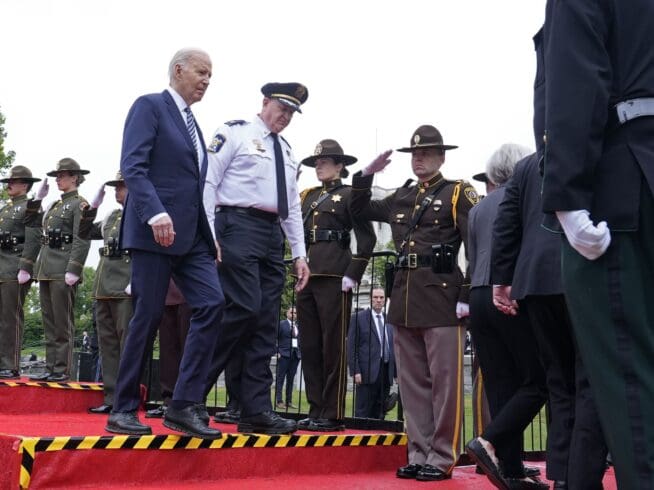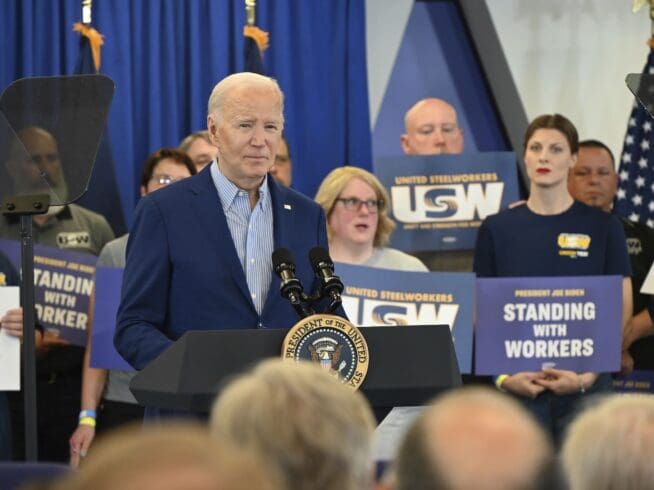Mike Rogers says he supports UAW strike but fought against union consistently in Congress
The Michigan Republican Senate hopeful slammed the United Auto Workers for their strike in 2007.
Days after moving from Florida to Michigan to run for Senate, Republican former Rep. Mike Rogers framed himself as an ally of striking automobile workers. But over his 14 years in the U.S. House of Representatives, Rogers repeatedly attacked their union.
“Autoworkers are crucial to our economy and after years of concessions, they deserve a fair deal,” Rogers, one of multiple Republicans running for the open seat of retiring Democratic Sen. Debbie Stabenow in 2024, told Politico on Sept. 17.
Rogers represented Michigan in the House between 2001 and 2015 before moving to Florida. Over his time in Congress, he repeatedly attacked the UAW and voted consistently against the interests of workers.
Unable to reach a collective bargaining agreement with top Detroit automobile manufacturers, United Auto Workers launched what it calls “the Stand Up Strike” at some General Motors, Stellantis, and Ford factories on Sept. 15.
“The Big Three have made a quarter trillion dollars over the last 10 years,” union president Shawn Fain said in a video message. “They made $21 billion in profits in the first half of this year alone. We will not stand by as corporate executives and the rich continue to make extraordinary profits while the rest of us continue to get left further and further behind.”
The Associated Press reported that in 2007, when the union went on strike against GM, Rogers vocally sided with management:
As Michigan faces incredibly difficult economic times, I am very disappointed that the United Auto Workers could not come to an adequate agreement with the management of Michigan’s largest and most important job provider, General Motors. There were numerous other options to the union that did not involve hurting the paychecks of Michigan families or letting down the future security of their members’ jobs. As General Motors has recently taken positive steps forward, this decision is a step backward. This strike will not turn one outbound moving van around.
Two years earlier, when GM and the UAW sought federal help to deal with rising health care costs, Rogers dismissed them, telling the AP: “The federal government isn’t going to come out and bail out their health care – the government isn’t going to assume their health care costs. It has to be a partnership.”
The nonprofit group Vote Smart lists Rogers’ UAW ratings for 2001-2007 and 2009. Over those years, he voted with the group’s interests less than 9% of the time.
According to the AFL-CIO’s scorecard for 2014, Rogers’ final full year in the House, Rogers had a lifetime record of voting just 11% with working people.
Among the anti-worker votes the group recorded were votes to repeal wage protections for construction workers that are guaranteed under the Davis-Bacon Act of 1931.
In 2003, he backed a George W. Bush administration plan to make millions of American workers ineligible for overtime pay and co-sponsored a bill to replace overtime pay with extra time off.
Rogers voted for a 2013 bill that would have temporarily stopped the National Labor Relations Board from taking “any action that requires a quorum of the members.” The AFL-CIO said it “would effectively shut down the NLRB and needlessly place the rights of millions of American workers in jeopardy.”
Asked by the American Independent Foundation about his apparent position shift, Rogers sent the same comment he had given to Politico, adding, “I was an advocate for Michigan’s workers and auto industry as a Congressman, and I will continue those efforts in the Senate”
The Cook Political Report lists the race as competitive but leaning Democratic.
Published with permission of The American Independent Foundation.




